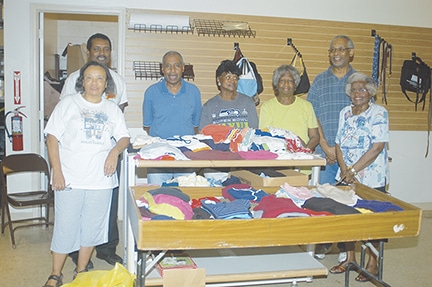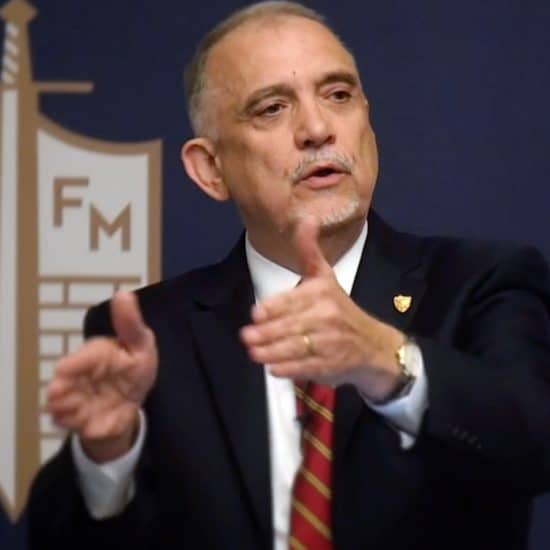
Before the government offered social services, the church — Christians who ministered to the whole person, meeting physical needs and sharing the good news of God’s grace and mercy — did so.
 Tension sometimes still arises between social ministry and verbal evangelism. How is “Christian” social ministry different than the efforts of other faith traditions and humanitarian organizations? Or should it be?
Tension sometimes still arises between social ministry and verbal evangelism. How is “Christian” social ministry different than the efforts of other faith traditions and humanitarian organizations? Or should it be?
The tension between social action and evangelism is historical, rather than biblical, in nature, believes Ryan Gladwin, coordinator of the Christian Social Ministry Program at Palm Beach Atlantic University in West Palm Beach, Fla.
Theologians such as John Wesley and Charles Finney confronted social issues of their day. Later, a move toward considering evangelization and a verbal witness as more important gained momentum.
“We’re just now recovering from that,” Gladwin said. A return to an understanding of a holistic gospel began with theologians and thinkers in South America and Africa, he added.
Although “creative tension” exists between the two, Richard “Dick” Olson, Central Baptist Theological Seminary distinguished professor of pastoral theology, also believes people are reached more effectively when Christians both serve and tell.
Christians understand the Great Commission — to go and tell others and develop disciples — and the Great Commandment — to love God first and to love others as themselves. But if believers don’t act on the Great Commission, the Great Commandment is empty, he said.
 The Judeo-Christian ethic and the lives of the prophets, particularly reflected in Micah — justice and mercy — and in Amos 5 — justice and righteousness — “are a very foundational part of who we are,” Olson pointed out. Believers also are shaped by the “very practical bent of the book of James” and its emphasis that faith without works is dead.
The Judeo-Christian ethic and the lives of the prophets, particularly reflected in Micah — justice and mercy — and in Amos 5 — justice and righteousness — “are a very foundational part of who we are,” Olson pointed out. Believers also are shaped by the “very practical bent of the book of James” and its emphasis that faith without works is dead.
 The CBTS professor noted the influence of Colin Williams, the executive director of the National Council of Churches in Christ Central Department of Evangelism in the 1960s. Williams insisted that believers who render action should be prepared to give a witness and should watch for opportunities to witness.
The CBTS professor noted the influence of Colin Williams, the executive director of the National Council of Churches in Christ Central Department of Evangelism in the 1960s. Williams insisted that believers who render action should be prepared to give a witness and should watch for opportunities to witness.
The integration of service and witness is part of the larger ecumenical push. “Collin Williams said, ‘The service we render validates what we believe,’” Olson added.
Gladwin emphasized that any type of social ministry that makes a difference over a long period must include spirituality for the people who serve and for those being served. “We who work in serving others believe in doing it integrally — the spirit, the physical and the emotional realities…,” he said.
Christians have to be clear why they serve, whether they give a testimony at the time of service or watch for an opportunity to do so later, Gladwin added.
Answering the “why” of service remains at the heart of ministry for Cynthia Saddler, coordinating pastor of congregational relationships at Englewood Baptist Church in Gladstone, Mo. She centers ministry and life around the parable of the sheep and the goats in Matthew 25:35-40, serving the least in the community. She said she constantly asks herself: “When did I do this?”
“I personally always keep this in mind as I minister,” she said. When believers are serving a need as Jesus did, opportunities to share their story opens.
Saddler watches for and takes advantage of those opportunities whenever possible, through church ministries and with her not-for-profit organization, GLOW: Girls Leading Our World, a Kansas City-based ministry to reach at-risk young women.
She always speaks to people she encounters and offers to pray with them as a way to make deeper connections.
While assisting with the food pantry one day, Saddler met a young woman waiting to pick up a packet of food and told her to call whenever she wanted prayer or needed to talk. “I might do that because I believe you mean it,” the young woman responded.
Saddler sees service as a means to help people realize their spiritual needs. “There is a lot of deep-seated need for people to know Christ…. They are hungry in body and hungry in soul,” she said.
 The church needs to offer the living water it has. “A lot of times, if you just sit down and talk with people…stop serving long enough to sit down with them and ask what else they need…they are open,…” she said.
The church needs to offer the living water it has. “A lot of times, if you just sit down and talk with people…stop serving long enough to sit down with them and ask what else they need…they are open,…” she said.
Believers then can share the One who loves them. “We can share…‘Let me introduce you to someone who gives peace,’” Saddler said.
Olson believes today’s social atmosphere emphasizes the value of stories. An individual’s story “is the witness of what’s been happening in my life and why I participate in this work,” he said. As believers share their own stories, they can ask those they serve: “What’s your story?”
And Christians should be open to sharing their story while working in partnership with people of other faith traditions. “True people of faith appreciate when others are upfront with their faith and their reasons for serving,” Gladwin said.
That openness sometimes helps bridge differences that not only allows service, but also develops relationships across denominations and faith traditions.
Olson relates that a man planned to marry a woman from a Roman Catholic background and wanted Olson, a Protestant, to participate in the ceremony with the local priest. The priest agreed more readily because of the ministry of Bethel Neighborhood Center across racial and economic differences in downtown Kansas City.
All three ministers agree that service and a verbal witness go together and that service should not be used as simply a way to win converts. Requiring a person to attend a worship service or Bible study is a form of using social ministry as a device, Gladwin said.
Christians must serve “with honor,” Saddler emphasized. All people, regardless of social or economic position, want and deserve to be treated with respect. People need to see that believers are honored to serve them, the former social worker said.
“Serve honorably and with integrity. Always allow people their dignity,” she added.
“People should see that difference in how you serve,” she said. “We must really serve in the name of Jesus…. The church should be willing to do whatever it takes to meet the needs of the total person.”

